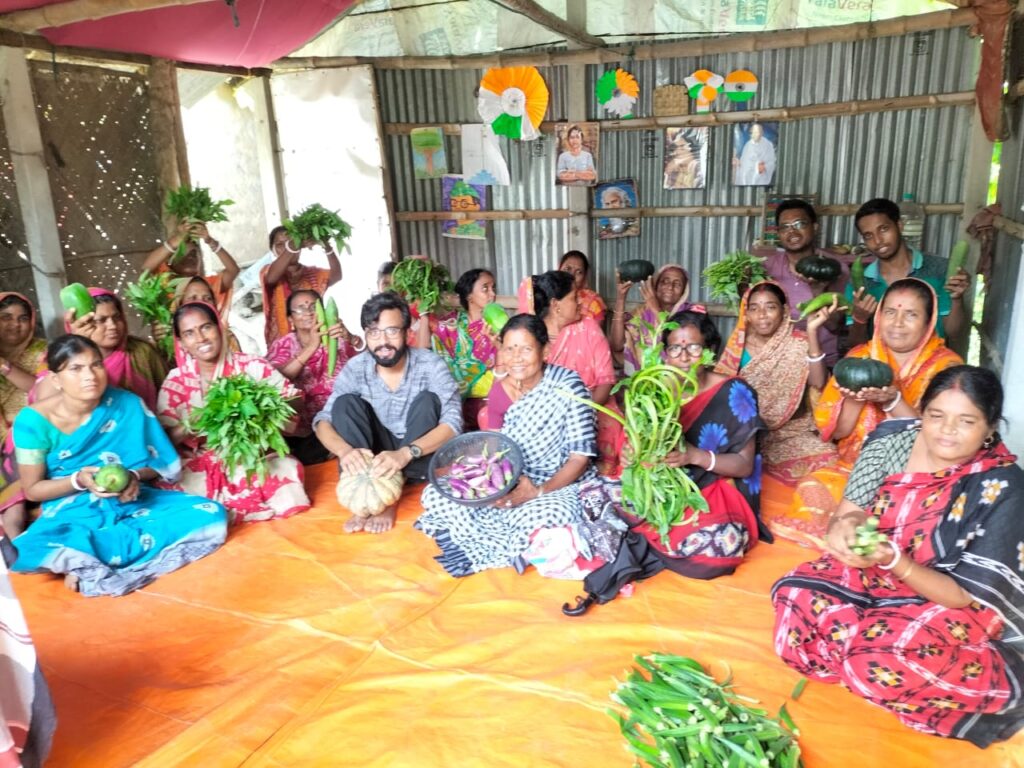Quarterly Newsletter 3: 2022
Quarterly Newsletter 3: 2022

“All we have to decide is what to do with the time that is given us.” When the world is in such a mess these words give us inspiration. We at bon have decided to help people connect to nature by working with them to grow their food. We have passed nine months working towards this goal. Welcome to our third quarterly newsletter of 2022.
Projects:
ankur, which means sprout in Bengali officially started at Beginning of August. In this project, we are creating model nutrition gardens to show our village community (in southern West Bengal) that even in a small space a lot of nutritious food can be grown. As part of ankur, we organized two days introductory nutrition garden training program on the 9th and 10th of September. This was attended by 10 participants. Because of delayed monsoon, we have not managed to start planting in our gardens yet. As the rain is slowly receding our work is progressing in full swing.
urja, means energy. We are in the pilot phase of this project where we are trying to encourage young people of age 8-22 to create small plots where they can plant whatever they like. Through this, we want to make the young generation interested in growing food and help them to connect with their environment. Through urja, we want to grab the opportunity to channel the energy of the young people. This will prepare them to avoid future food crisis while restoring local environment.

Discussions during the two days training program on nutrition garden

Bed preparation for planting vegetables is in one of our gardens
People:
Mrs. Snehalata Bhanja is a woman farmer of her early sixties. Along with her husband she has been growing vegetables for their home consumption for the last 30 years. The surplus produces they sell in the market. In our last Newsletter, we mentioned we were learning a lot from them. During one of our conversations when we mentioned if they would like to try a trail plot of growing vegetables using our methods they immediately agreed. Our intention is to help them grow vegetables while improving the health of the land over time. We do so by adopting earth friendly farming practices and abandoning the chemical inputs which they sometimes use in their garden.
Mrs. Jharna Rani Das is in her mid-40s, a woman who is actively involved in a local self-help group. She has experience growing tubers like ginger and elephant foot yam in the past only using leaf litters. When approached to join the introductory training program on nutrition garden, she agreed immediately. Her engagement during the training was quite encouraging. After the program, she decided to be part of ankur and create a nutrition garden.

Mrs. Snehalata interacting with the trainer during the two days training program

Mrs. Jharna in her home where she is working on preparing vegetable bed
Mr. Sujit Das is in 9th standard, yet he is way mature for his age. A few conversations with him caught our attention. When asked if he would like to create a nutrition garden in his free time, he happily decided to join. Creating gardens is giving Sujit exposure to hands-on science which he is missing in his school curriculum.
Mr. Suman Das is a 5th grader who seemed to be interested in plants. During one of our conversations, we asked Suman to write down the name of all plants that grow in his home. To our surprise, he came back with a long list of over sixty plants. Suman is working with Sujit and a few other children from the neighbourhood to create a few vegetable beds. To our curious readers, we will share about this “community garden” in our next Newsletter.

Sujit in light-hearted mood during the two days nutrition garden training program

Suman is busy climbing tree during one of group activities
Organizations:
Dularia is a tribal-led project to create an experimental space for natural living. With them, we are collaborating to create a nutrition garden in the centre of Dularia. We are designing the garden while learning indigenous practices of gardening from Dularia team members.
In the month of September, we were invited by Mr. Biplab Das the founder of Kishalay Foundation to visit his project area in the Mangrove region of West Bengal. They are working on education and nutrition for children. During our visit, we got to interact with around 30 women who are working on creating community nutrition gardens with the help of Goonj. Those interactions were very encouraging, and we are working on possibilities for collaboration.

A selfie with team Dularia in the first visit to the experimental centre

Group photo during our visit to Kishalay foundation
Announcements:
- Mr.Dipatarka Chakrborty has gifted us a projector for our Movie club project where we will be showing movies and documentaries to create discussion platform in the community.